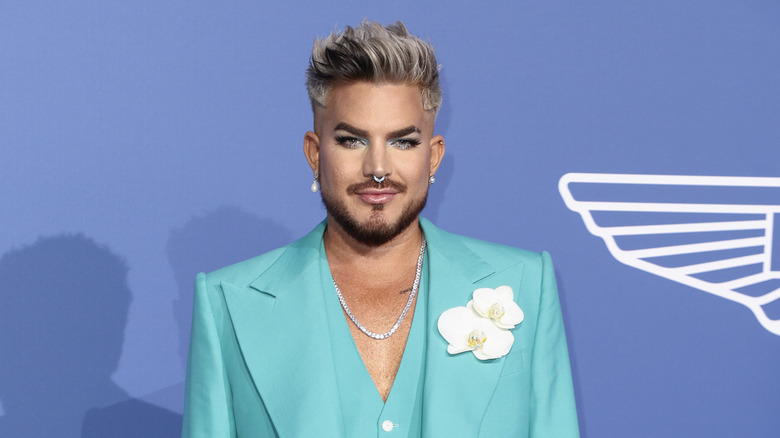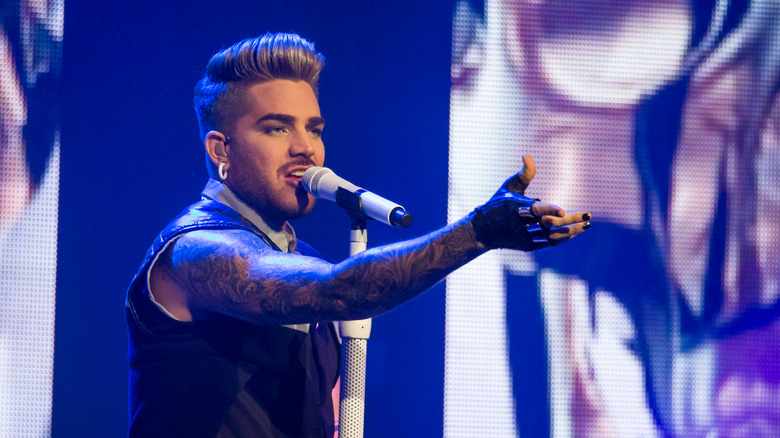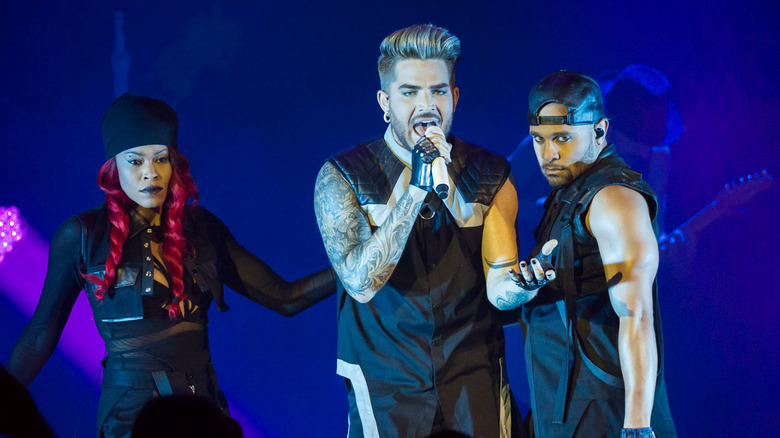Adam Lambert Says Coming Out Is 'An Act Of Defiance' - Here's His Story
Singer, songwriter, and "American Idol" alum Adam Lambert has sold over 3 million albums and 5 million singles across the globe and has also earned wide acclaim as the lead singer for legendary band Queen, a role that he took on in 2011 (via Smooth Radio). Filling the shoes of Freddie Mercury is no small task, but Lambert's powerful vocals and unabashed queerness are fitting tribute to the late and great singer.
But Lamber's rise to stardom wasn't a smooth one, at least not on a personal level. When the then-unknown talent was first competing on "American Idol" in 2009, he had already come out as gay to his closest family and friends, but had not openly talked about that part of his identity publicly on the national stage. It is generally understood that "outing" another person as being a part of the LGBTQIA+ community is wrong, as it is up to each individual as to when, where, and how they wish to "come out." Unfortunately, once a person finds themselves in the spotlight and rises to the level of celebrity, such rules seem to go out the window in favor of eye-catching headlines.
This is exactly what happened to Lambert when photos of him kissing an ex-boyfriend were leaked to the media while he was a contestant on "American Idol," landing his sexual identity in the spotlight alongside his undeniable talent in a way that Lambert had not consented to.
How Adam Lambert dealt with being outed
As soon as the photos of Lambert and his ex-boyfriend surfaced, media outlets jumped at the chance to share their thoughts and to make a spectacle of Adam Lambert who, at the time, was simply trying to make a name for himself as a gifted vocalist on "American Idol" (via BBC). Fox News, known for its conservative viewpoints, covered the story and went so far as to call the photos "embarrassing." Entertainment Weekly's headline about the singer wasn't much better. The magazine plastered Lambert on its cover with the line, "The Most Exciting American Idol Contestant in Years (And Not Just Because He Might Be Gay)."
At the time, Lambert was left scrambling, trying to figure out how to respond. "It was stressful and it was confusing," the singer told BBC in 2019. "I was like, 'What am I supposed to do?'" Keep in mind that while 2009 might not feel like very long ago, it still was a significantly different time where it came to the level of acceptance of LGBTQIA+ individuals. At the time, gay couples still didn't even have a federally-protected right to marry.
Now, looking back on the situation, Lambert is glad and proud that he decided to lean into his truth rather than to deny it, even though he had the situation thrust upon him rather than being given the space and freedom to come out publicly in his own time and in his own way.
How Lambert now sees the act of coming out
"In hindsight I realize there is power in coming out," Lambert told BBC. "The act of declaring your sexuality publicly, once you're a public figure, is an act of defiance in some ways, and it's also a form of activism." He went on to say that he is glad to see so many more artists claiming their LGBTQIA+ identities publicly, as it helps to break down barriers, squash stigma, and proves that one's sexuality should not keep them from being able to have a successful career.
Speaking about Sam Smith, Lambert said, "Sam is a really interesting example because they have been able to be fully mainstream." While conservative groups have railed against Smith lately, Lambert says he is glad to see that for the most part, Smith's songs are gaining traction widely, are played on the radio everywhere, and are being bought by people of all backgrounds and beliefs. "I mean, mums and dads are buying Sam's album. That's a big move, a big step," said Lambert.


